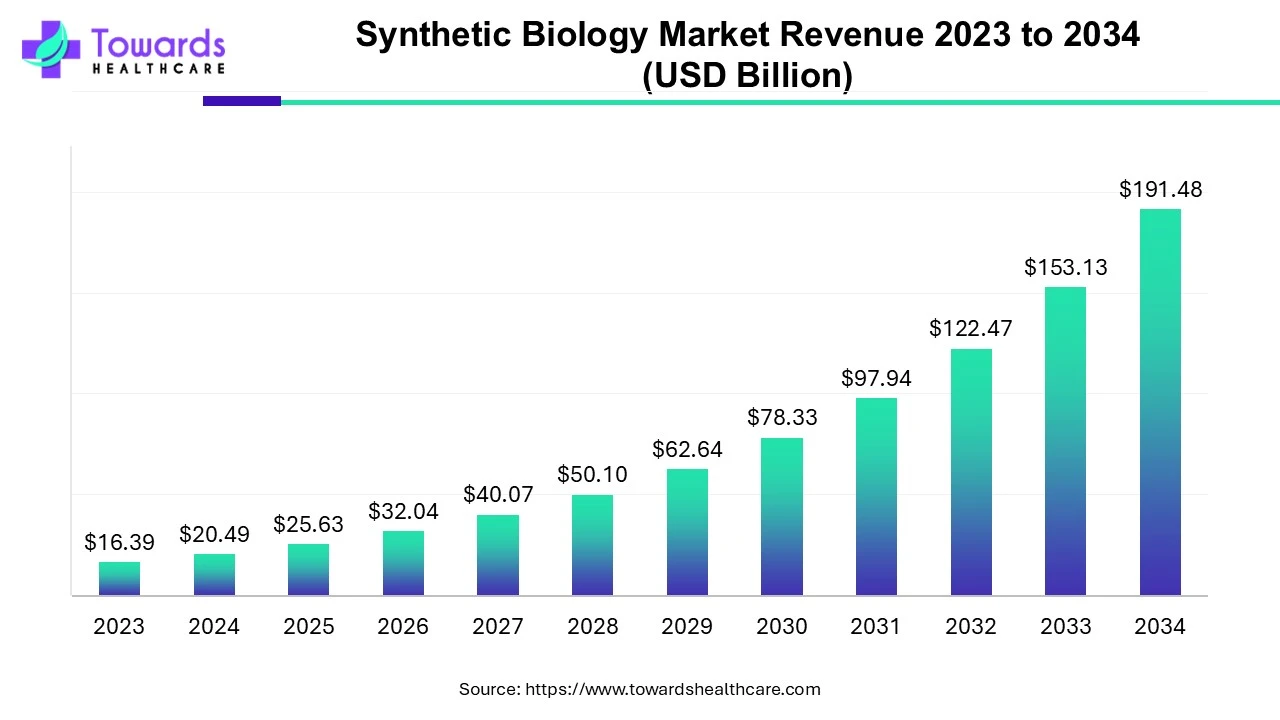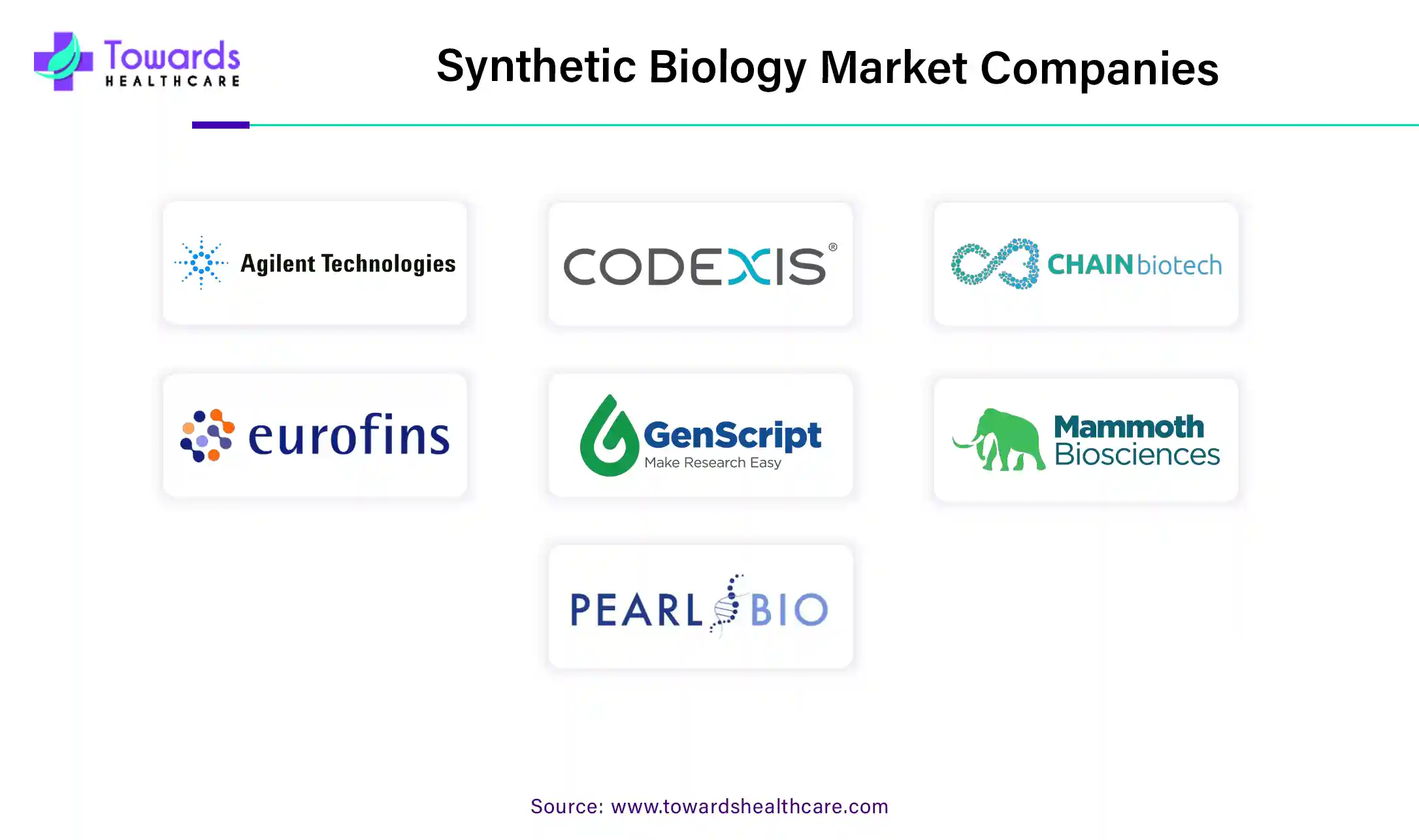December 2025

The synthetic biology market was estimated at US$ 16.39 billion in 2023 and is projected to grow to US$ 191.48 billion by 2034, rising at a compound annual growth rate (CAGR) of 25.04% from 2024 to 2034.

Synthetic biology is a field of science in which an organism's genetic code is modified to develop new abilities. Organisms are redesigned to produce a substance, such as medicine or fuel, or gain a new ability. Synthetic biology is similar to genome editing. Synthetic biologists use DNA synthesis technologies to either modify the genes of other organisms or synthesize new ones and then incorporate them into an organism. A common example of synthetic biology includes rice modified to produce beta-carotene, a nutrient that prevents vitamin A deficiency. Hence, synthetic biology has generated diagnostic tools that improve the care of patients with infectious and other chronic diseases.
The demand for synthetic biology increases with the advent of novel technologies for effectively synthesizing DNA. Growing research areas like genomics and proteomics also boost market growth. The market is also driven by increasing investments to promote the biotechnology sector and favorable government policies. The rising demand for personalized medicines also augments market growth.
The synthetic biology market is primarily driven by advancements in gene-editing technologies like CRISPR, which enable precise modifications of DNA, leading to innovative solutions across various industries. The demand for sustainable and eco-friendly production methods is increasing, as synthetic biology offers alternatives to traditional manufacturing processes, such as bio-based chemicals, biofuels, and biodegradable materials. Additionally, the need for personalized medicine and the development of targeted therapies are fueling the growth of the synthetic biology market. In agriculture, synthetic biology helps improve crop yields, pest resistance, and reduce dependency on chemical fertilizers and pesticides. As industries seek more efficient, cost-effective, and environmentally friendly solutions, the potential of synthetic biology to address global challenges such as climate change, resource scarcity, and healthcare access continues to drive market expansion.
Synthetic biology is a rapidly evolving field with frequent innovations and evolutions in the sector. The recent innovations are a result of advances in microfluidics, transformation, and genome editing to culture species and insert large DNA fragments. Synthetic biology offers a new research direction for the treatment of diseases. Some examples of recent innovations include CRISPR-Cas9, DNA synthesis technology, synthetic cells, and metabolic engineering. Researchers develop novel methods to simplify the process and investigate extended applications of synthetic biology in diverse fields such as food, agriculture, and space. The advent of advanced technologies like artificial intelligence also streamlines the process. AI models can create regulatory DNA sequences that drive gene expression in specific cell types. The combination of AI and synthetic biology accelerates and scale-up the process and drastically reduces the process cost.
The major challenge of the market includes ethical issues involved in synthetic biology. There is a potential risk to safety due to the possibility of several off-target effects, i.e., edits in the wrong place. The other ethical issues include informed consent, justice and equity, and genome-editing research involving embryos. Another major challenge of the market is scalability. Large-scale production of bioprocesses is challenging, leading to inaccurate results.
North America held the largest share of the synthetic biology market in 2023. The rising prevalence of chronic disorders, state-of-the-art research and development facilities, technological advancements, increasing investments & collaborations, and the presence of key players drive the market. Several government organizations support the development of synthetic biology through numerous initiatives and stringent policies. It is reported that the US government’s synthetic biology research funding was nearly $161 million for FY2022. Countries like the US and Canada are at the forefront of increasing awareness about synthetic biology techniques across the region by frequently organizing workshops and symposiums. Additionally, the Canadian government has made synthetic biology part of its strategy to address provincial challenges and grow the economy.
Asia-Pacific is anticipated to grow at the fastest rate in the market during the forecast period. The rising geriatric population, increasing incidences of chronic disorders, increasing investments & collaborations, rapidly expanding biotech sector, growing research and development activities, and technological advancements drive the market. The primary market of synthetic biology market witnessed 1039 investment and financing events, accounting for more than RMB 92 billion in funding from 2018 to 2022. It is reported that more than $900 million were invested into breakthrough deep science biotechnology startups in India between 2013 and 2023.
For instance,
Europe is expected to grow at a notable CAGR in the synthetic biology market in the foreseeable future. The increasing research and development activities and the rapidly expanding biotech sector augment the market. The rising adoption of advanced technologies and the growing demand for precision medicine also promote market growth. Several government organizations launch initiatives and provide funding for genomics and proteomics research. The Synthetic Biology for Growth programme by the UK research councils supports synthetic biology research.
For instance,
By technology, the PCR technology segment held a dominant presence in the market. Polymerase Chain Reaction (PCR) is used to amplify DNA sequences. This segment dominated because PCR is the most common technique with higher precision and sensitivity, and it is used for testing infectious diseases and other disorders. The rising prevalence of infectious disorders, technological advancements, and the COVID-19 pandemic potentiate the market growth.
By technology, the genome editing technology segment is predicted to witness significant growth in the market over the forecast period. Genome editing is a technique to alter an organism’s DNA. The latest innovations and the rising demand for genomics research drive the market.
By product, the oligonucleotide/oligo pools and synthetic DNA segment accounted for the largest share of the market. The demand for oligonucleotides is increasing because they are short, single-stranded DNA or RNA that serve as a starting point for many synthetic biology applications. Their diverse applications in genetic testing, forensic research, and next-generation sequencing augment market growth.
By product, the enzymes segment is anticipated to grow with the highest CAGR in the market during the studied years. Enzymes are commonly used in every synthetic biology process to catalyze the process. They have widespread use in drug development, tumor diagnosis, organic synthesis, etc.
By application, the healthcare segment led the global market and is expected to grow at the fastest rate in the market during the forecast period. Synthetic biology is predominantly used in the healthcare sector, and it has both clinical and non-clinical applications. Synthetic biology techniques are used to diagnose and treat chronic disorders, drug discovery & development, personalized medicines, and antibody & vaccine discovery.
By end-use, the biotechnology & pharmaceutical companies segment dominated the market. The presence of suitable infrastructure, increasing investments, and the presence of trained professionals promote the market.
By end-use, the academic & government research institutes will gain a significant share of the market over the studied period. The increasing funding opportunities and advanced research and development facilities boost the market.

Dr. Avencia Sánchez-Mejias, CEO of Integra Therapeutics, revealed at a conference its new gene writing technology, FICAT, to contribute to the prevention and treatment of genetic diseases and cancer. She commented that the synthetic biology market is growing because it has demonstrated its revolutionary capacity to transform the development and production of therapies, vaccines, and diagnostics.
By Technology
By Product
By Application
By End-Use
By Region
December 2025
November 2025
November 2025
December 2025